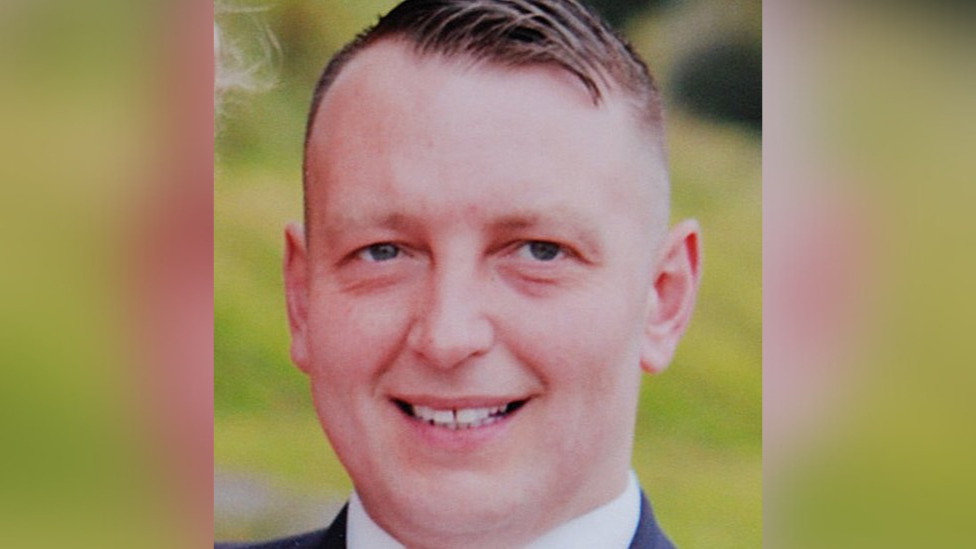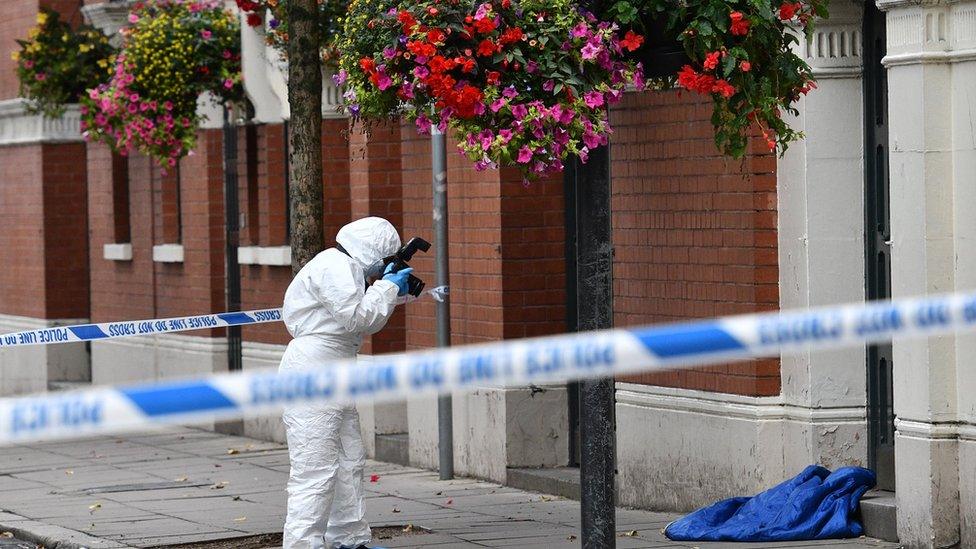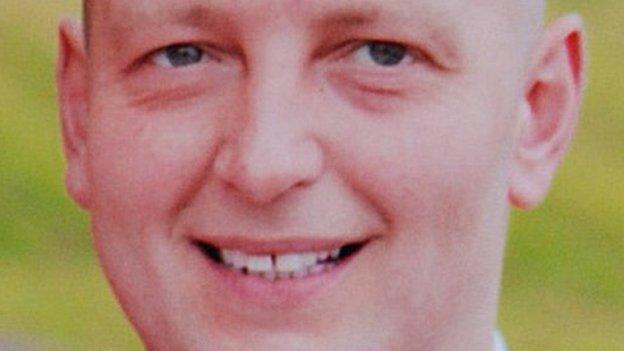Gerard McMahon: Ombudsman identifies police failings before death
- Published

Gerard McMahon was 36 when he died
Multiple failings in the police's handling of an incident in which a man died after being restrained face-down by officers have been identified by the Police Ombudsman.
Gerard McMahon from the Short Strand in east Belfast died 14 hours after being handcuffed and restrained in Belfast.
He was arrested by officers responding to a report of an altercation between him and taxi drivers in September 2016.
The 36-year-old later suffered a cardiac arrest.
The Police Service of Northern Ireland (PSNI) offered Mr McMahon's family its "ongoing sympathy and condolences" and said it had accepted and implemented recommendations for change in its procedures.
Mr McMahon was under the influence of cocaine when he was arrested near the Grand Opera House in Great Victoria Street.
When officers arrived to the reports of a disturbance they found him half-dressed and disoriented.
Three officers engaged with him before handcuffing him and restraining him face-down following a struggle, which involved the use of CS spray.
After he had been held down for about five minutes, police realised he had become unresponsive but there was a delay in calling an ambulance.
Two officers were disciplined for failing to call for the ambulance more quickly, while one of those officers was also disciplined for using CS spray.
The police ombudsman Marie Anderson said on Thursday she was disappointed that the PSNI "decided not to implement a number of other disciplinary recommendations made following enquiries by her office".
These related to the way in which Mr McMahon had been handcuffed and restrained, and a delay in officers administering CPR.
She noted, however, that Mr McMahon would likely have died even if CPR had been started immediately.
Mrs Anderson said she recognised that the three officers involved in Mr McMahon's restraint had made determined and extended efforts to save Mr McMahon's life, but added that "her enquiries had identified a series of concerns".
She recommended all three officers should face misconduct hearings.

The incident happened in Great Victoria Street in Belfast in 2016
She described as "unsatisfactory" the PSNI's decision not to hold misconduct hearings as recommended, to implement disciplinary sanctions against only two officers in relation to only some of the identified failings, and to take no action against the third officer.
However, she welcomed "a positive response" from the PSNI to recommendations for changes in police procedures as a result of lessons learned during her investigation.
These recommendations were made within four months of Mr McMahon's death "to ensure improvements to policing practice at the earliest opportunity".
They included recommendations for improved training to help police officers better identify and respond to Acute Behavioural Disturbance (ABD), which Mr McMahon had experienced prior to and while being restrained.
Mrs Anderson said that there had been "a lack of planning and communication" between the officers involved in restraining Mr McMahon.
She also said:
A failure by officers to react to the developing situation had exposed Mr McMahon to "risks associated with being restrained in the prone position for an extended period of time"
When he first showed "signs of resistance" the handcuffs should have been moved from the front of his body to the rear
Officers also had "no clear plan as to how long Mr McMahon would be restrained in the prone position"
The investigation also identified failings by two police officers based in the PSNI's Urban Call Management Centre.
The officers were the subject of measures designed to improve their conduct for failing to request CCTV coverage of Mr McMahon following reports that he was potentially a risk to himself and others in the hours prior to being detained by police.
Mrs Anderson added: "This was a tragic case involving the death of a young man.
"I note the comments of the coroner at Mr McMahon's inquest who stated that my investigators had 'discharged their duty impeccably and to a very high standard'.
"The investigation led to lessons being learned from tragic circumstances, and the improvement of policing via a number of recommendations which were accepted by the PSNI."
Deputy Chief Constable Chris Todd said he acknowledged the pain of the McMahon family and that the publication of the report would be "another difficult day for them".
"The police ombudsman's recommendations were considered and two officers received discipline sanctions as a result," he added.
"I note that the Ombudsman has expressed dissatisfaction at this outcome but it should also be noted that due process was followed in accordance with the Police Conduct Regulations."
Inquest findings
In March 2021, at an inquest into Mr McMahon's death, coroner Joseph McCrisken said the force used during the restraint was justified but the restraint itself was poor in terms of technique.
He found that the officers involved and the PSNI had a responsibility to receive training and this was a joint failure.
Mr McCrisken also said the use of CS spray at close quarters during the incident was not justified.
DCC Todd referred to this ruling and said that while the coroner was "satisfied that the level of force used was justified, he described the application as poor."
"The Ccoroner also noted however that three specific officers deserved considerable praise and recognition for their efforts at attempting to resuscitate Mr McMahon," he added.
- Published12 March 2021
